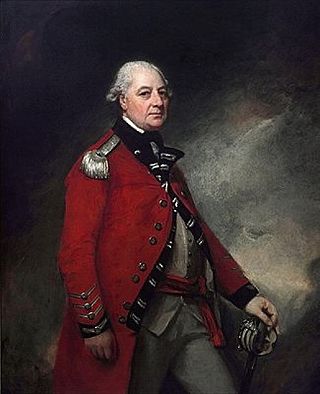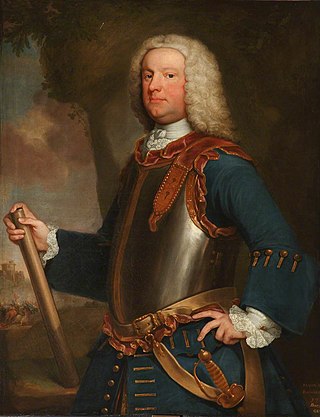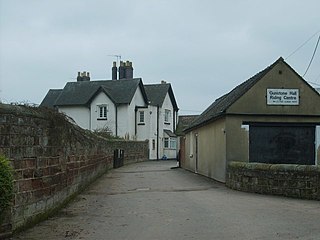Related Research Articles

General James Abercrombie or Abercromby of Glassaugh, Banffshire was a British Army general and Whig politician who sat in the House of Commons from 1734 to 1754. He was commander-in-chief of forces in North America during the French and Indian War, best known for the disastrous British losses in the 1758 Battle of Carillon.

Lieutenant-General Sir Eyre Coote, KB was an Anglo-Irish military officer and politician who sat in the House of Commons from 1768 to 1780. He is best known for his many years of service with the British Army in India. His victory at the Battle of Wandiwash is considered a decisive turning point in the struggle for control in India between Britain and France. He was known by his sepoy troops as Coote Bahadur.

William Alexander, also known as Lord Stirling, was a Scottish-American major general during the American Revolutionary War. He was considered male heir to the Scottish title of Earl of Stirling through Scottish lineage, and he sought the title sometime after 1756. His claim was initially granted by a Scottish court in 1759; however, the House of Lords ultimately overruled Scottish law and denied the title in 1762. He continued to hold himself out as "Lord Stirling" regardless.

Field Marshal John Ligonier, 1st Earl Ligonier,, styled Sir John Ligonier from 1743 to 1757, was a French-born British soldier and politician who fought for the English and British armies for more than half a century. In 1757, he was appointed Commander-in-chief and raised to the peerage as Viscount Ligonier in 1757, and in 1766 further elevated as Earl Ligonier.

Field Marshal Sir Robert Rich, 4th Baronet was a British cavalry officer. As a junior officer he fought at the Battle of Schellenberg and at the Battle of Blenheim during the War of the Spanish Succession. He was then asked to raise a regiment to combat the threat from the Jacobite rising of 1715. He also served with the Pragmatic Army under the Earl of Stair at the Battle of Dettingen during the War of the Austrian Succession. As a Member of Parliament he represented three different constituencies but never attained political office.

Field Marshal George Townshend, 1st Marquess Townshend, PC, known as The Viscount Townshend from 1764 to 1787, was a British soldier and politician. After serving at the Battle of Dettingen during the War of the Austrian Succession and the Battle of Culloden during the Jacobite Rising, Townshend took command of the British forces for the closing stages of the Battle of the Plains of Abraham during the Seven Years' War. He went on to be Lord Lieutenant of Ireland or Viceroy where he introduced measures aimed at increasing the size of Irish regiments, reducing corruption in Ireland and improving the Irish economy. In cooperation with Prime Minister North in London, he solidified governmental control over Ireland. He also served as Master-General of the Ordnance, first in the North Ministry and then in the Fox–North Coalition.

Sir John Cope was a British soldier, and Whig Member of Parliament, representing three separate constituencies between 1722 and 1741. He is now chiefly remembered for his defeat at Prestonpans, the first significant battle of the Jacobite rising of 1745 and which was commemorated by the tune "Hey, Johnnie Cope, Are Ye Waking Yet?", which still features in modern Scottish folk music and bagpipe recitals.

Lieutenant-General William Blakeney, 1st Baron Blakeney, KB was a British Army officer and politician who served from 1695 until 1756. From 1725 to 1757, he also sat in the Parliament of Ireland as MP for Kilmallock, although he rarely attended.
General John Waldegrave, 3rd Earl Waldegrave was a British politician and soldier.

Clan Haldane is a Lowland Scottish clan.

General Sir Charles Howard KB, was a British Army officer and politician.

Lieutenant-General Richard Onslow was a British Army officer and politician. After the death of their parents, his older brother Arthur bought him a captain's commission in the British Army. He first saw action in the Anglo-Spanish War in 1727, after which he was returned to Parliament for the family borough of Guildford. His political contributions were negligible in comparison to his brother, and he continued to serve as a career officer, holding commands in the War of the Austrian Succession at Dettingen and Fontenoy. In 1759, he was appointed Governor of Plymouth and commander of the Western District, and died as a lieutenant-general the following year while presiding over two prominent courts-martial.

Lieutenant General Thomas Fowke, also spelt Foulks, circa 1690 to 29 March 1765, was a British military officer from South Staffordshire, who was Governor of Gibraltar from 1753 to 1756, and twice court-martialled during his service. The first followed defeat at Prestonpans in the 1745 Jacobite Rising, when he was acquitted. As Governor, he was tried again for his part in the 1756 Battle of Minorca, a defeat that led to the execution of Admiral Byng.

James Cholmondeley was a British Army officer and Member of Parliament between 1731 and 1747.

Lieutenant-General Sir James Campbell, KB was a Scottish military officer and Whig politician who sat in the British House of Commons from 1727 to 1741, representing the constituency of Ayrshire. A distinguished cavalry officer, Campbell began his military career at a young age and fought in several conflicts of the Second Hundred Years' War, along with serving as the governor of Edinburgh Castle from 1738 until his death in 1745.
Rev Patrick Haldane of Gleneagles MP (1683–1769) was a Scottish classicist, advocate, politician and judge.
George Evans, 2nd Baron Carbery, known until 1749 as Hon. George Evans, was a British politician. Like his father, he represented Westbury as a Whig. Evans entered the British House of Commons in 1734 as a supporter of the Walpole administration. He was in financial difficulties by 1743, and did not stand for election again in 1747. Succeeding his father as an Irish peer in 1749, he sat in the Irish House of Lords until his death a decade later.
John Craufurd was a British Army officer and politician who sat in the House of Commons between 1761 and 1764.
References
- ↑ Sedgwick, Romney R. (1970). "HALDANE, Patrick (c.1683–1769), of Bearcrofts, Stirling". In R. Sedgwick (ed.). The History of Parliament: the House of Commons 1715–1754. Boydell and Brewer. Retrieved 26 December 2015.
- ↑ Historical reference
- ↑ https://archive.org/stream/cu31924020417527/cu31924020417527_djvu.txt Appointment as Governor of Jamaica
- ↑ http://www.math.buffalo.edu/mad/special/Williams_Francis1700-70.html William Francis Eulogy
- ↑ Krise, Thomas (1999). Caribbeana. Chicago: University of Chicago Press. p. 315. ISBN 9780226453927.